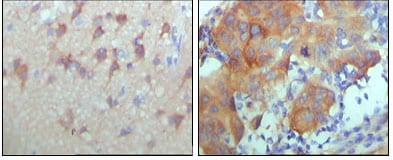
| WB | 咨询技术 | Human,Mouse,Rat |
| IF | 咨询技术 | Human,Mouse,Rat |
| IHC | 1/200 - 1/1000 | Human,Mouse,Rat |
| ICC | 技术咨询 | Human,Mouse,Rat |
| FCM | 咨询技术 | Human,Mouse,Rat |
| Elisa | 1/10000 | Human,Mouse,Rat |
| Aliases | HER3; LCCS2 |
| Entrez GeneID | 2065 |
| clone | 3F10F6 |
| Host/Isotype | Mouse IgG1 |
| Antibody Type | Primary antibody |
| Storage | Store at 4°C short term. Aliquot and store at -20°C long term. Avoid freeze/thaw cycles. |
| Species Reactivity | Human |
| Immunogen | Purified recombinant fragment of ERBB3 (aa1175-1275) expressed in E. Coli. |
| Formulation | Ascitic fluid containing 0.03% sodium azide. |
+ +
以下是3篇关于ERBB3抗体的代表性文献及其摘要概括:
1. **"Antitumor efficacy of a novel anti-ERBB3 antibody in pancreatic cancer"**
- **作者**: Mirschberger, C. 等(2013)
- **摘要**: 研究报道了一种新型抗ERBB3单克隆抗体(MM-121)在胰腺癌模型中的效果,证明其通过阻断ERBB3与配体结合抑制下游信号通路(如PI3K/AKT),从而抑制肿瘤生长并增强化疗敏感性。
2. **"MEHD7945A: A novel dual-action antibody targeting EGFR and HER3 with superior therapeutic efficacy"**
- **作者**: Schoeberl, B. 等(2010)
- **摘要**: 开发了一种双特异性抗体MEHD7945A,可同时靶向EGFR和ERBB3(HER3),通过阻断配体诱导的受体激活并促进抗体依赖性细胞毒性(ADCC),在结直肠癌和头颈癌模型中显示出强效抗肿瘤活性。
3. **"HER3 is required for HER2-induced tumorigenesis in breast cancer"**
- **作者**: Garrett, J.T. 等(2003)
- **摘要**: 通过解析ERBB3胞外结构域,揭示其与配体heregulin的结合机制,并证明抗ERBB3抗体可通过阻断配体依赖性HER2/HER3异源二聚化,抑制乳腺癌细胞增殖和体内肿瘤形成。
4. **"ERBB3-mediated resistance to EGFR-targeted therapy in cancer"**
- **作者**: Sergina, N.V. 等(2007)
- **摘要**: 研究指出EGFR抑制剂(如西妥昔单抗)的耐药性与ERBB3信号代偿性激活相关,联合使用抗ERBB3抗体可恢复肿瘤细胞对EGFR靶向治疗的敏感性,为克服耐药提供策略。
以上文献涵盖ERBB3抗体的结构机制、双靶点设计、耐药性联合治疗及临床前模型验证等方向。
ERBB3. also known as HER3. is a member of the epidermal growth factor receptor (EGFR) family, which includes EGFR (HER1), HER2. and HER4. Structurally, ERBB3 consists of an extracellular ligand-binding domain, a transmembrane region, and an intracellular tyrosine kinase domain. Unlike other EGFR members, ERBB3 has impaired kinase activity, requiring heterodimerization with other receptors (e.g., HER2) to activate downstream signaling pathways such as PI3K/Akt and MAPK. These pathways regulate cell proliferation, survival, and differentiation. Dysregulation of ERBB3. through overexpression, mutations, or ligand-mediated activation, is implicated in tumorigenesis, metastasis, and therapy resistance in cancers like breast, gastric, and colorectal cancers.
ERBB3-targeting antibodies are therapeutic agents designed to block its oncogenic signaling. Monoclonal antibodies (e.g., patritumab, lumretuzumab) typically bind the extracellular domain, inhibiting ligand binding or receptor dimerization, thereby suppressing downstream signaling. Bispecific antibodies (e.g., HER2/HER3-targeting agents) enhance specificity and efficacy. Despite preclinical promise, clinical trials have shown mixed results, partly due to compensatory signaling, biomarker selection challenges, and drug resistance mechanisms. Current research focuses on optimizing antibody design, identifying predictive biomarkers, and exploring combination therapies with chemotherapy, radiation, or other targeted agents. ERBB3 remains a compelling target for overcoming resistance in EGFR/HER2-driven cancers.
×